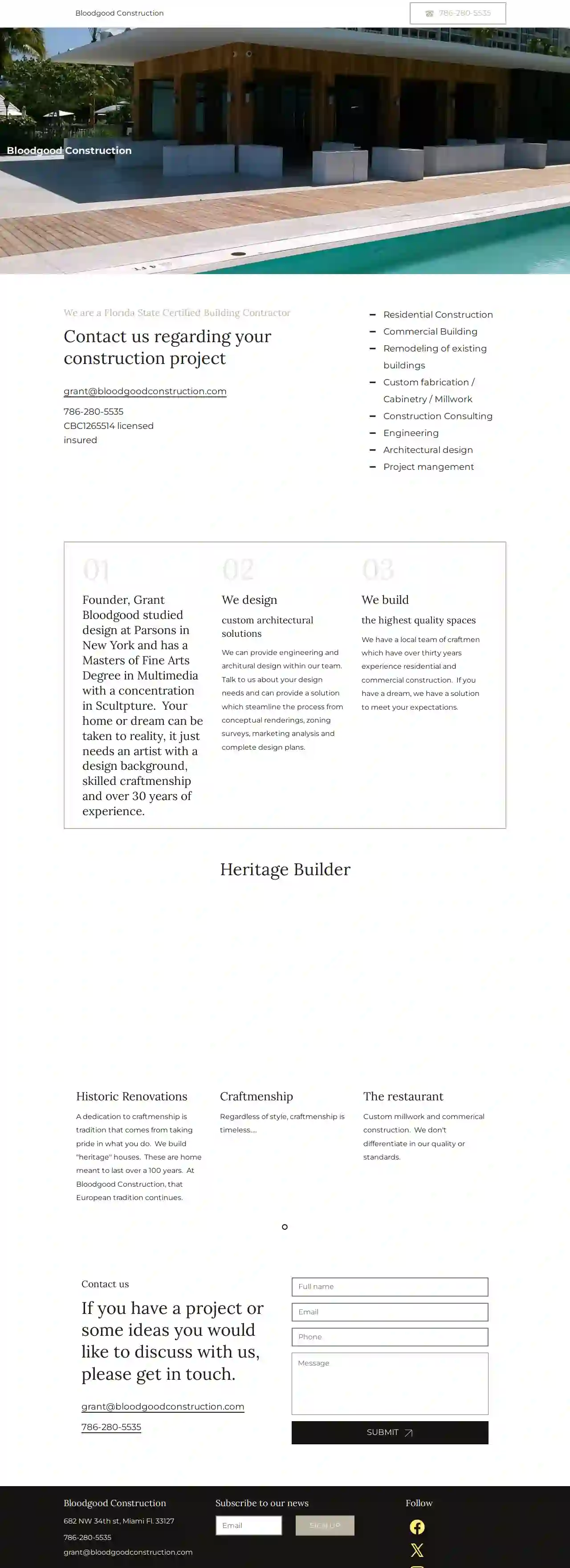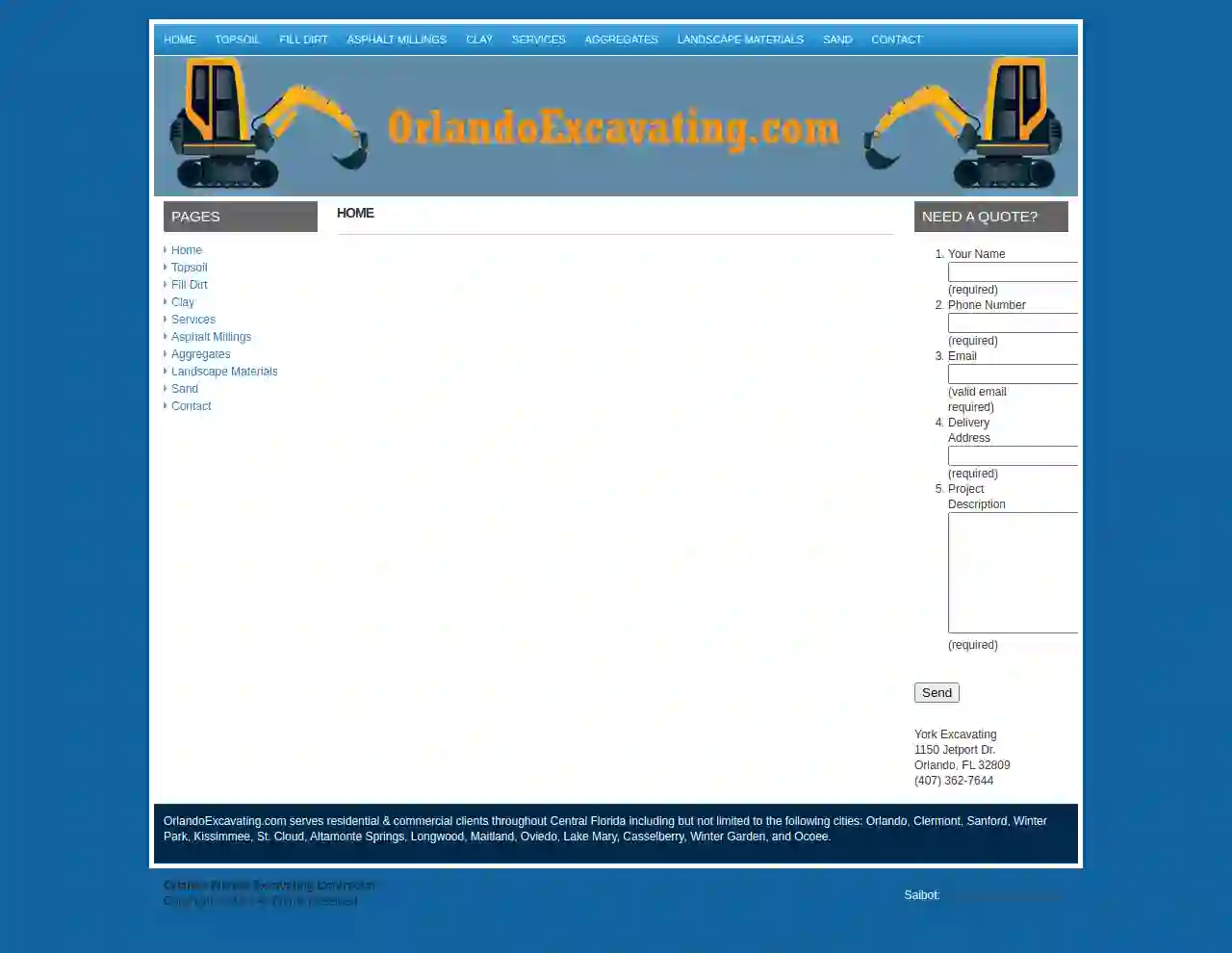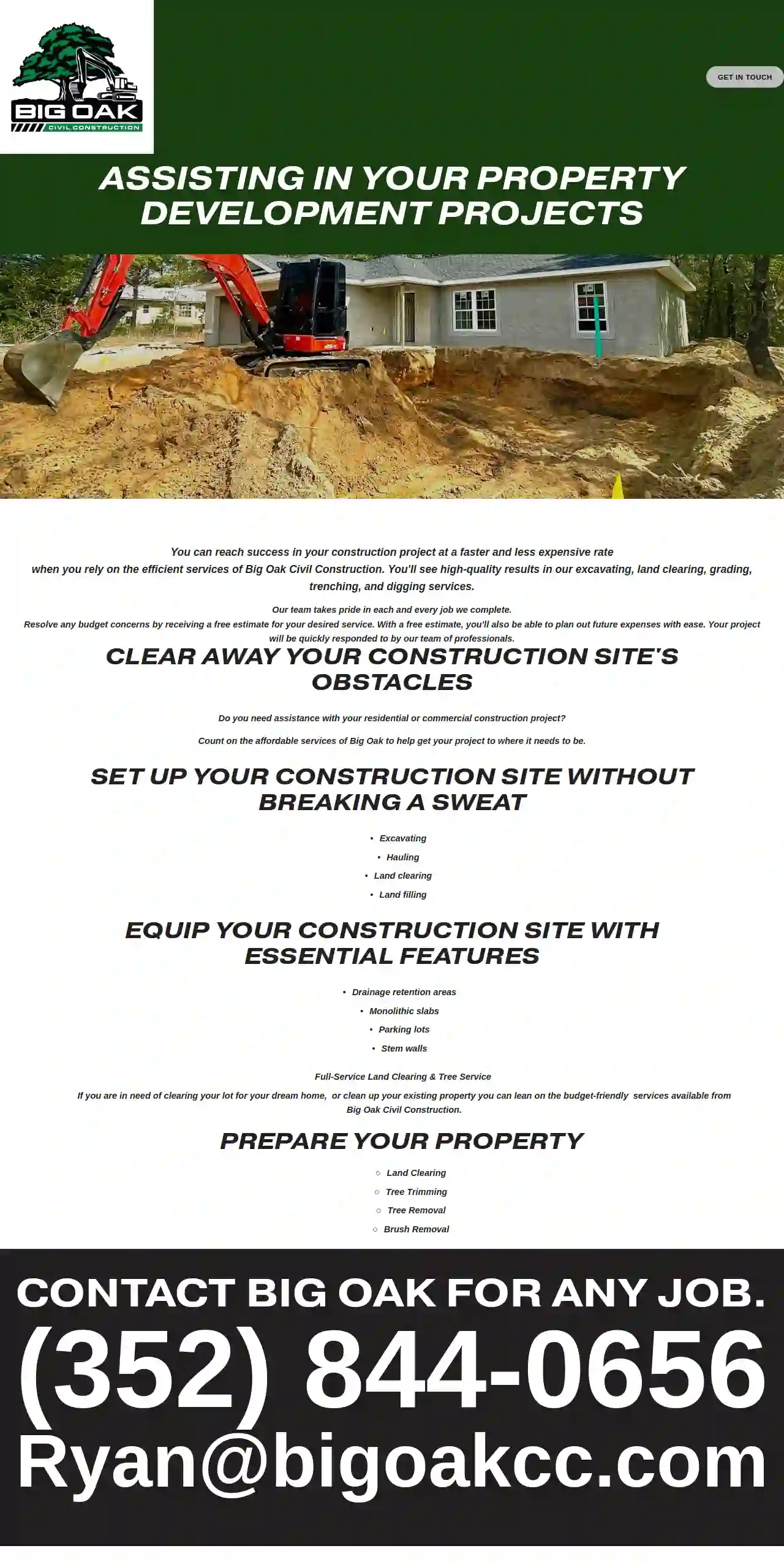Demolition Contractors Venice
Find the best Demolition Contractor in Venice
Receive multiple Demolition Contractor quotes for your project today! Compare profiles, reviews, accreditations, portfolio, etc... and choose the best service.

Ground FX Incorporated
57 reviewsFairfax, USGround FX Inc: Fairfax VA's Fastest Growing Land Clearing Company Serving Fairfax VA with Distinctive Land Clearing Solutions. Call us at (540) 728-0838 for Expert Services. Ground FX Inc., located in Fairfax, VA, offers specialized forestry mulching services designed to efficiently clear land while providing valuable benefits for land management and environmental health. We offer professional brush removal services designed to prepare your land for various uses, from construction and development to landscaping and agricultural projects. Transforming landscapes with professional land clearing, eco-friendly forestry mulching, precise excavation services, and balanced grading for optimal land use. Whether you're looking to build a tranquil backyard pond, a functional irrigation pond, or a scenic water feature for your property, our team has the expertise and equipment to deliver exceptional results. Prioritizing environmental responsibility through sustainable landscaping practices, thoughtful native plant selection, and vigilant vegetation management for resilient and vibrant outdoor environments. Whether you're installing new fencing, setting up utility lines, or maintaining existing rows, our team efficiently removes trees, brush, and debris from these critical areas. Hear Directly From Our Clients:Client reviews serve as a powerful validation of the hard work, dedication, and attention to detail that we pour into every landscaping project. Hearing directly from our clients about their positive experiences and the transformation of their outdoor spaces reinforces that our efforts are making a real impact on enhancing their lives. Ground FX Inc stands out for its holistic approach to landscaping. Unlike mere service providers, we function as outdoor space architects, integrating functionality, aesthetics, and sustainability seamlessly. Our team goes beyond the basics of land clearing and hardscape installation, considering the entire ecosystem. What truly sets Ground FX Inc apart is our commitment to a personalized and collaborative process. We understand that each client has a unique vision for their outdoor space. Our team collaborates closely with clients, taking the time to understand their preferences, lifestyle, and specific needs. Ground FX Inc is dedicated to leading the way in sustainable and eco-friendly landscaping practices. We prioritize environmentally conscious solutions throughout our projects, from utilizing native and drought-resistant plant species to employing forestry mulching techniques for land clearing.
- Services
- Why Us?
- Gallery
Get Quote
Shenandoah General Construction LLC
4.513 reviewsPort St. Lucie, USProtecting Infrastructure Shenandoah is an infrastructure inspection, restoration, and maintenance company committed to helping our customers develop and manage their maintenance programs. Problem Solving Culture We help our customers rework their infrastructure maintenance program from the ground up. The result is a maintenance program that helps stretch every dollar and operates at the highest optimal level. IRM Program Our Inspection, Restoration, and Maintenance (IRM) Program has helped maximize the performance of our customers sanitary and stormwater systems for over 45 years. LEARN ABOUT OUR IRM PROGRAM
- Services
- Why Us?
- Testimonials
- Gallery
Get Quote
Douglas Construction Dumping LLC
51 reviewsMiramar, 33023, USAbout Douglas Construction Dumping LLC Douglas Construction Dumping LLC is a reputable dump disposal company in Miramar, FL, known for its competent, honest, and experienced team. With a customer-centric approach, we've become a leading contractor in the area, delivering exceptional workmanship and services. We are committed to providing comprehensive assistance, specializing in the delivery of limestone, sand, gravel, rock, and asphalt. We also handle debris removal from construction, remodeling, and demolition sites, ensuring a smooth and efficient process for our clients. Our dedication to quality and adherence to industry standards and regulations make us a reliable partner for construction companies and specialty contractors. We are proud of our long-lasting relationships with our clients and strive to build trust and satisfaction with every project. We are committed to providing our clients with the highest quality services at competitive prices. We offer military, referral, and senior discounts, as well as a special offer for new clients. We are always looking for new projects and are eager to help you with your next construction or demolition project.
- Services
- Why Us?
- Testimonials
- Gallery
Get Quote
White’s Land Maintenance
511 reviewsPensacola, USAbout Us White's Land Maintenance is a full-service land clearing company serving Milton, FL and surrounding areas. We specialize in Forestry Mulching, land clearing, debris removal, tree trimming/removal, excavating, and grading services for residential and commercial properties. With our experience we can handle any job from small to large. We are committed to providing quality service with a friendly touch that will leave you with the perfect outdoor space you desire! What we are best at We offer a wide range of services to meet your land clearing and maintenance needs. Whether you need to clear a large tract of land, remove unwanted vegetation, or simply trim your trees, we have the experience and expertise to get the job done right.
- Services
- Why Us?
- Testimonials
- Gallery
Get Quote
FLORIDA MARINE CONSTRUCTION SERVICES LLC
53 reviewsPort St. Lucie, USBest Florida Marine Construction Services And Pricing Florida Marine Construction Services is your trusted partner for all your waterfront needs. We specialize in a wide range of marine construction services, including dock piling installation, dock lift installation, seawall construction and repair, and boat dock construction. Our team of experienced professionals is dedicated to delivering high-quality craftsmanship and exceptional customer service. We understand the importance of your waterfront property and strive to exceed your expectations with every project. From initial consultation to project completion, we are committed to providing a seamless and stress-free experience. Contact us today to discuss your project and receive a personalized quote.
- Services
- Why Us?
- Gallery
Get Quote
Js Brick Corporation
581 reviewsSarasota, USJSBrick Corporation: Your Trusted Paver Experts in Sarasota JSBrick has been serving Sarasota with exceptional brick and paver installation and maintenance services since 2000. Our commitment to quality products, outstanding service, and unparalleled customer care has been our hallmark from the very beginning. We are dedicated to providing our customers with a high level of professionalism throughout their experience with JS Brick Corporation. All our services are designed to make your life easier and stress-free. We go the extra mile to deliver truly exceptional service to each of our valued customers. We understand that your needs can change unexpectedly, and we are ready to adapt our services quickly to ensure your complete satisfaction. Don't just take our word for it! See what our satisfied customers have to say about our work.
- Services
- Why Us?
- Testimonials
- Gallery
Get Quote
Bloodgood Construction
51 reviews682 NW 34th st, Miami, 33127, USBloodgood Construction We are a Florida State Certified Building Contractor. Contact us regarding your construction project. Services Offered Residential Construction Commercial Building Remodeling of existing buildings Custom fabrication / Cabinetry / Millwork Construction Consulting Engineering Architectural design Project management About Us Grant Bloodgood, the founder, studied design at Parsons in New York and holds a Masters of Fine Arts Degree in Multimedia with a concentration in Sculpture. With over 30 years of experience, he brings his artistic vision and skilled craftsmanship to every project, transforming your home or dream into a reality. Our Approach We design custom architectural solutions, providing engineering and architectural design services within our team. We understand your design needs and offer solutions that streamline the process from conceptual renderings, zoning surveys, marketing analysis, and complete design plans. Quality Construction We have a local team of skilled craftsmen with over thirty years of experience in residential and commercial construction. We are committed to building the highest quality spaces, exceeding your expectations and bringing your dreams to life. Heritage Builder Our dedication to craftsmanship is a tradition rooted in taking pride in our work. We build "heritage" houses, homes designed to last over a century. At Bloodgood Construction, this European tradition continues. Craftmanship Regardless of style, craftsmanship is timeless. We apply the same high standards and quality to all our projects, whether it's a residential home or a commercial space. The Restaurant We specialize in custom millwork and commercial construction. Our commitment to quality and standards remains unwavering across all our projects.
- Services
- Why Us?
Get Quote
Orlando Florida Excavating Contractor
2.79 reviews1150 Jetport Dr., Orlando, 32809, USOrlando Excavating is a trusted excavating contractor serving residential and commercial clients throughout Central Florida. We offer a wide range of services, including topsoil, fill dirt, asphalt millings, clay, aggregates, landscape materials, and sand. Our team of experienced professionals is dedicated to providing high-quality services at competitive prices. We are committed to safety and environmental responsibility, and we strive to exceed our clients' expectations on every project. We are proud to serve the following cities in Central Florida: Orlando, Clermont, Sanford, Winter Park, Kissimmee, St. Cloud, Altamonte Springs, Longwood, Maitland, Oviedo, Lake Mary, Casselberry, Winter Garden, and Ocoee.
- Services
- Why Us?
Get Quote
Big Oak Civil Construction
52 reviewsOcala, USAssisting in Your Property Development Projects You can reach success in your construction project at a faster and less expensive rate when you rely on the efficient services of Big Oak Civil Construction. You'll see high-quality results in our excavating, land clearing, grading, trenching, and digging services. Our team takes pride in each and every job we complete. Resolve any budget concerns by receiving a free estimate for your desired service. With a free estimate, you'll also be able to plan out future expenses with ease. Your project will be quickly responded to by our team of professionals.
- Services
- Why Us?
- Gallery
Get Quote
Habana Excavating Inc
51 reviews2300 Palm Beach Lake Blvd, Suite 305, 2300 Palm Beach Lake Blvd Suite 305, West Palm Beach, 33409, USHabana Excavating Inc. - Your West Palm Beach Excavation Experts When you need the best construction service in West Palm Beach, you need Habana Excavating Inc. Founded as a local company with world-class ability, our team is ready and willing to deliver the work you need to take your project to the next level. We are a service-oriented excavation partner that knows what it means to deliver top-notch solutions, meet deadlines, and follow your project specifications. We value your business and will work hard to ensure you call us the next time you have an excavation job. Contact Habana Excavating Inc. at 561-689-0058 for peerless excavation work at affordable prices.
- Services
- Why Us?
- Gallery
Get Quote
Over 22,076+ Excavation Contractors in our network
Our excavation providers operate in Venice & surroundings!
ExcavationHQ has curated and vetted Top Excavation Contractors arround Venice. Find a top & trustworthy contractor today.
Frequently Asked Questions About Demolition Contractors
- Recycling: Concrete, brick, metal, and wood can be recycled and reused in other construction projects, reducing waste sent to landfills.
- Landfill Disposal: Non-recyclable materials are disposed of in designated landfills according to local regulations.
- Donation: Some materials, such as fixtures or appliances, may be suitable for donation to charitable organizations.
- Feasibility Studies: Assessing the viability and challenges of a demolition project.
- Demolition Planning: Developing demolition plans, including method selection, sequencing, and safety procedures.
- Permitting Assistance: Navigating the demolition permitting process and ensuring compliance with regulations.
- Hazardous Material Surveys: Identifying and managing hazardous materials, such as asbestos and lead paint.
- Cost Estimating: Providing accurate cost estimates for demolition services.
- Project Management: Overseeing the demolition process and ensuring it proceeds as planned.
- Size and Complexity of the Structure: Larger and more complex structures, such as multi-story buildings, require more time, labor, and specialized equipment, increasing costs.
- Type of Demolition: Different demolition methods, such as implosion, wrecking ball, or high-reach demolition, have varying costs.
- Material Disposal: Disposal fees for demolition debris can contribute significantly to the overall cost, depending on the type and quantity of materials.
- Location and Accessibility: Demolition in densely populated areas or with limited access may require more planning and specialized equipment, affecting costs.
- Hazardous Materials: The presence of asbestos, lead paint, or other hazardous materials requires specialized removal and disposal procedures, adding to the expenses.
- 'Can I see proof of your licensing and insurance?' Verify their credentials and coverage.
- 'What experience do you have with projects like mine?' Ensure they have relevant expertise.
- 'Can you provide references from past clients?' Check their reputation and customer satisfaction.
- 'What are your safety protocols?' Prioritize contractors who emphasize safety.
- 'How will you handle hazardous materials?' Ensure they have proper procedures for asbestos or lead abatement.
- 'What is your timeline for completing the project?' Understand the project duration.
- 'How will you manage noise, dust, and debris?' Discuss mitigation measures for minimizing disruption.
- 'What are your payment terms?' Clarify payment schedules and any required deposits.
What happens to the debris after demolition?
What is the role of a demolition consultant?
How much does demolition cost in the USA?
What questions should I ask a demolition contractor before hiring them?
What happens to the debris after demolition?
- Recycling: Concrete, brick, metal, and wood can be recycled and reused in other construction projects, reducing waste sent to landfills.
- Landfill Disposal: Non-recyclable materials are disposed of in designated landfills according to local regulations.
- Donation: Some materials, such as fixtures or appliances, may be suitable for donation to charitable organizations.
What is the role of a demolition consultant?
- Feasibility Studies: Assessing the viability and challenges of a demolition project.
- Demolition Planning: Developing demolition plans, including method selection, sequencing, and safety procedures.
- Permitting Assistance: Navigating the demolition permitting process and ensuring compliance with regulations.
- Hazardous Material Surveys: Identifying and managing hazardous materials, such as asbestos and lead paint.
- Cost Estimating: Providing accurate cost estimates for demolition services.
- Project Management: Overseeing the demolition process and ensuring it proceeds as planned.
How much does demolition cost in the USA?
- Size and Complexity of the Structure: Larger and more complex structures, such as multi-story buildings, require more time, labor, and specialized equipment, increasing costs.
- Type of Demolition: Different demolition methods, such as implosion, wrecking ball, or high-reach demolition, have varying costs.
- Material Disposal: Disposal fees for demolition debris can contribute significantly to the overall cost, depending on the type and quantity of materials.
- Location and Accessibility: Demolition in densely populated areas or with limited access may require more planning and specialized equipment, affecting costs.
- Hazardous Materials: The presence of asbestos, lead paint, or other hazardous materials requires specialized removal and disposal procedures, adding to the expenses.
What questions should I ask a demolition contractor before hiring them?
- 'Can I see proof of your licensing and insurance?' Verify their credentials and coverage.
- 'What experience do you have with projects like mine?' Ensure they have relevant expertise.
- 'Can you provide references from past clients?' Check their reputation and customer satisfaction.
- 'What are your safety protocols?' Prioritize contractors who emphasize safety.
- 'How will you handle hazardous materials?' Ensure they have proper procedures for asbestos or lead abatement.
- 'What is your timeline for completing the project?' Understand the project duration.
- 'How will you manage noise, dust, and debris?' Discuss mitigation measures for minimizing disruption.
- 'What are your payment terms?' Clarify payment schedules and any required deposits.